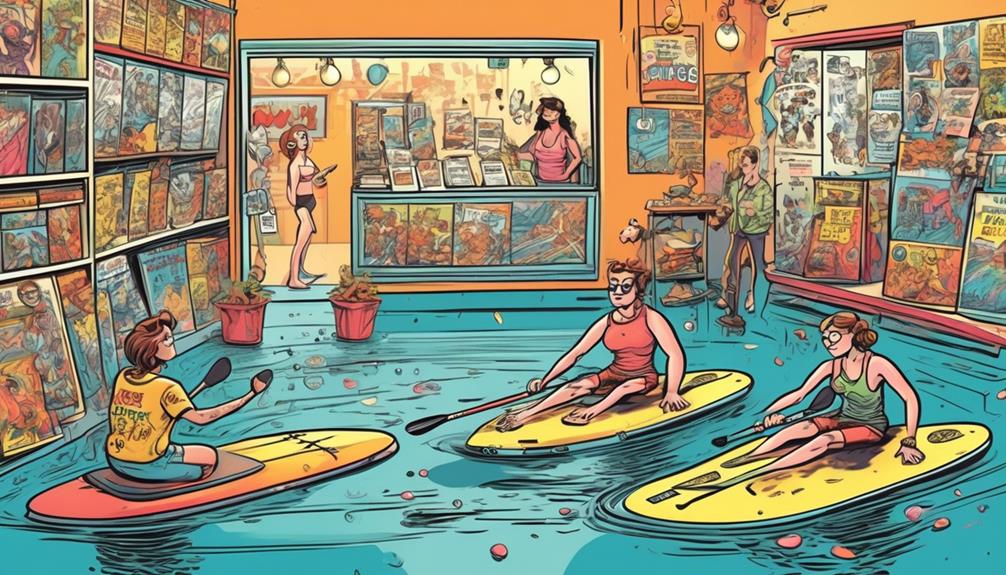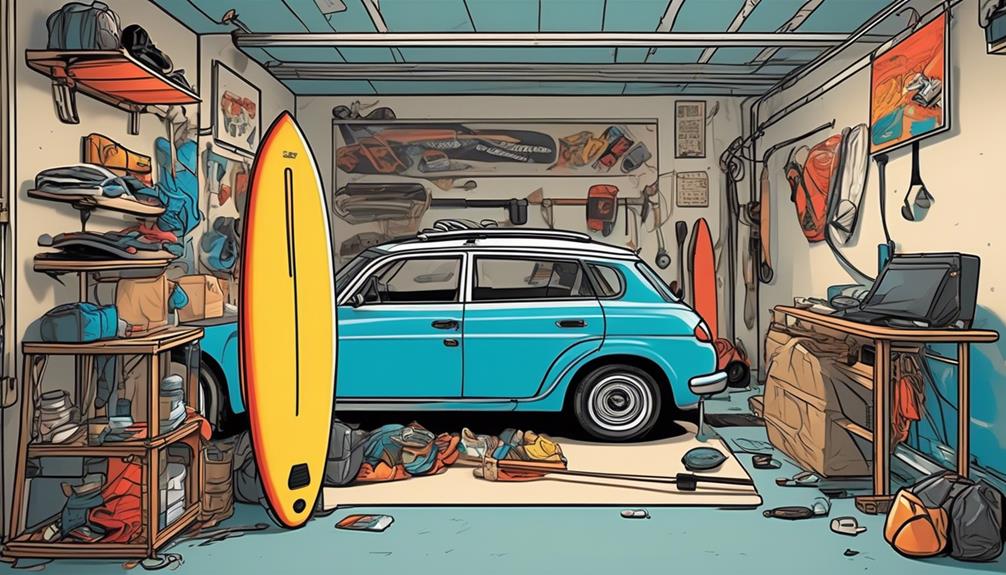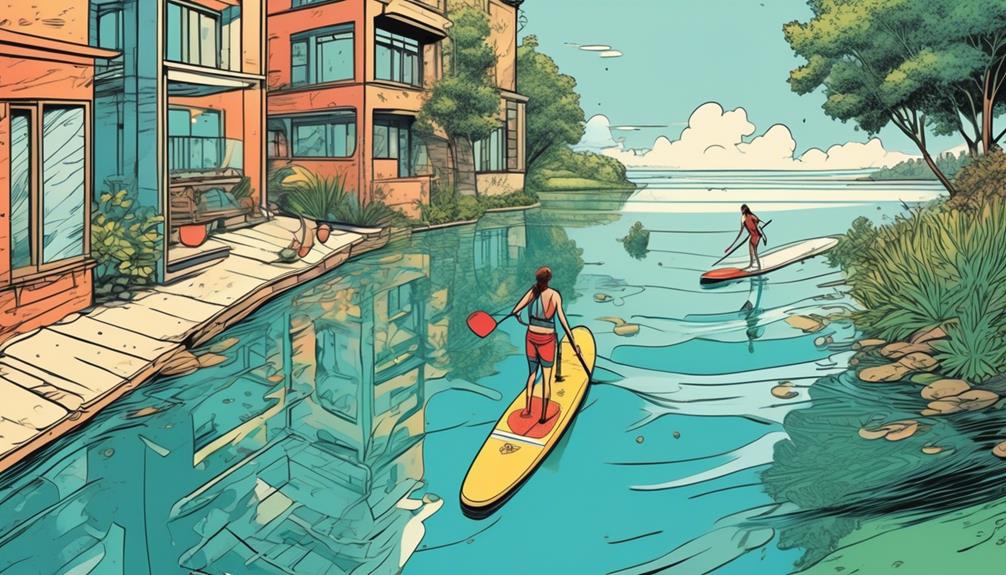Deciding whether to rent or buy an inflatable paddle board? Let's break it down with some real talk and hard facts.
If you're anything like me, you've stared at the water, board rentals in sight, and wondered, 'Is it worth it to just own one?'
It's not just about the upfront cost. We need to consider how often you'll actually use it, where you'll store it, and if paddling is a true fit for your lifestyle.
Sure, renting seems easy and flexible, but owning means unlimited adventures on your terms.
Looking at the data, it turns out that if you hit the water more than a few times a month, buying quickly becomes more cost-effective than renting. Plus, having your own gear can significantly boost your frequency and enjoyment of the activity.
So, if you're leaning towards making paddle boarding a regular part of your life, investing in your own board might just be the smarter move.
Let's dive into the details and figure out what's best for you.
Key Takeaways
- Renting a paddle board can be a convenient option for occasional users, but the costs can add up quickly.
- Buying a paddle board upfront may seem expensive, but it becomes more cost-effective if you paddle more than 10 times a year.
- Owning a paddle board allows for unlimited adventures without additional expenses and the ability to customize and personalize the board.
- Renting is suitable for those with limited free time or diverse hobbies, while buying is ideal for passionate paddle boarders committed to long-term use and sustainability.
Understanding the Costs

When you're torn between renting or buying an inflatable paddle board, it boils down to the numbers. Let's get straight to the point: I've been there, done that, and got the T-shirt.
Renting might seem chill at first. It's like, 'Cool, I can just grab a board whenever I feel like hitting the water.' No stress about where to stash it during the off-season or how to keep it in top shape. But, let me hit you with some real talk: those rental fees? They start to look pretty gnarly once you're out there every weekend. Imagine spending $50 to $100 a pop, and suddenly, after just a handful of outings, you're staring down the barrel of a few hundred bucks gone with the wind.
Now, flipping the script to buying. Yeah, you're gonna have to fork out a chunk of change upfront. We're talking a decent inflatable paddle board setting you back anywhere from $600 to $1000. Plus, you might need to splash out on some extra gear. But here's where it gets interesting. That's your one-and-done deal. You're not throwing cash into the rental void anymore. It's yours. Forever. And if you're hitting the waves like it's your job, that initial cost starts to look like pocket change.
So, I crunched the numbers, because, let's face it, who doesn't love a good spreadsheet? If you're paddling more than 10 times a year, the math is clear. Buying beats renting hands down. You break even in about a season or two, and after that? It's all savings, baby.
From my own experience—and I'm pretty passionate about getting out on the water as much as possible—buying an inflatable paddle board is the way to go. It's not just about owning some cool gear; it's about investing in what you love. For those of you who live and breathe paddle boarding, who dream of carving through the water and exploring every nook and cranny of the coastline, owning your own board is a no-brainer.
Assessing Usage Frequency
Figuring out how often you'll be hitting the water is a big deal in the rent vs. buy debate for an inflatable paddle board. If you're someone who only plans on paddling a few times a year, renting might just be your best bet. You're dodging the bullet of a hefty upfront cost, saving yourself a headache on where to store this beast, and sidestepping maintenance woes.
On the flip side, if you see yourself as a regular on the waters, buying an inflatable paddle board is a no-brainer. It's not only about how often you go, but also the freedom it brings. Imagine this: you wake up one morning, the weather is perfect, and you just feel like hitting the water. If you own the board, you're out the door in minutes. No need to stress about rental availability or sticking to someone else's schedule.
Now, let's talk numbers because, let's face it, they don't lie. After doing a bit of math, I've found that if you're out there more than just a handful of times each season, owning starts to make financial sense. Beyond just the numbers, owning a board that's tailored to your style and needs has its perks. It's like the difference between wearing custom-tailored suits versus off-the-rack ones – the fit just feels right.
So, you might be wondering, 'What's the break-even point?' Well, based on average rental costs and the price of a decent inflatable paddle board, if you're paddling more than 10-12 times a year, buying is likely the more economical choice. Plus, there's the unquantifiable joy of having your own gear.
In essence, it boils down to this: if you're an occasional paddler, renting could save you money and hassle. But for those of you who crave the spontaneity and freedom of hitting the water on your terms, and do so regularly, buying is undeniably the smarter move. Think about it, which scenario fits you best? Are you ready to invest in countless adventures, or does the flexibility of renting appeal more to your occasional paddleboarding whim?
Considering Storage Solutions

So, you've got yourself an inflatable paddle board. Great choice! They're way easier to store than the rigid ones, but that doesn't mean you can just shove it anywhere and forget about it. You're looking to keep this bad boy in tip-top shape for as long as possible, right? Well, let's talk storage solutions that aren't only smart but also kind of cool.
First off, always, and I mean always, dry your board completely before storing it. Why? Because mold and mildew are real party poopers and can seriously shorten the life span of your paddle board. I've seen it happen, and it's not pretty. A cool, dry place is your best bet. I'm talking about places like a garage, closet, or even under the bed if you're tight on space. These spots keep your board out of those pesky extreme temperatures that can do a number on the material.
Now, if you're like me and always looking for innovative solutions, then wall hangers or ceiling racks designed for paddle boards might just be your jam. Not only do they save a ton of space, but they also turn your board into a piece of art. I mean, who wouldn't want that?
But here's the kicker, improper storage can lead to a whole lot of unnecessary wear and tear. I've made it my mission to check on my board regularly, even when it's not paddle board season. It's a small effort that pays off big time, ensuring my board is always ready for the next adventure.
Choosing the right storage isn't just about being practical; it's about protecting your investment. And for those of us who thrive on innovation, it's a fantastic opportunity to get creative with our space. Trust me, your paddle board will thank you, and you'll thank yourself when it's still in pristine condition years down the line.
Lifestyle Compatibility
When it comes to deciding between owning or renting an inflatable paddle board, it's all about lining it up with your lifestyle, space, and how you actually live day-to-day.
Let's get real for a second: you might think, 'Oh, I love the spontaneity and adventure—buying is totally for me.' But let's look at the numbers and facts that might sway that decision.
Did you know that, on average, most gear like paddle boards are only used 5 to 10 times a year by recreational users? That's right. Despite the initial excitement, the reality is that many of us overestimate our free time and underutilize our purchases. So, if you're someone who's juggling a 9-5, has a packed weekend social calendar, or maybe just enjoys a variety of hobbies, renting mightn't just be the more budget-friendly option but the smarter choice to avoid an expensive dust collector in your garage.
Now, if you're leaning towards buying because you're out there on the water every chance you get, let's talk sustainability. Owning means you're in it for the long haul. You're looking at maintenance, repairs, and taking care of your gear to avoid the need for frequent replacements. This isn't just good for your wallet over time; it's a win for the planet too. A study found that well-maintained outdoor gear can last years, even decades, reducing waste and promoting a sustainable lifestyle. It's about forming a connection with what you own and taking responsibility for its lifecycle.
However, the commitment doesn't stop at maintenance. You've got to consider the storage solution that fits your living space. Do you have the room to store it without turning your home into an episode of 'Hoarders'? Remember, an inflatable paddle board, while more compact than its rigid counterparts, still requires space to dry out and store properly to avoid mold or damage.
So, what's it going to be? If you're someone who values flexibility and variety, and maybe isn't ready to commit to the maintenance and storage demands, renting offers the adventure without the strings attached. On the flip side, if you're hitting the water more often than not and are ready to invest in something that aligns with a sustainable, eco-conscious lifestyle, buying might just be the move for you.
In the end, it's about weighing the practicality against the passion. Whether you buy or rent, make sure it's a decision that won't just float your boat but also fit seamlessly into your life.

